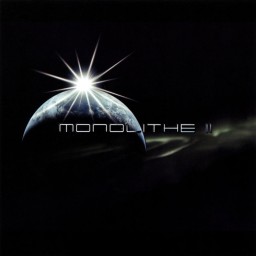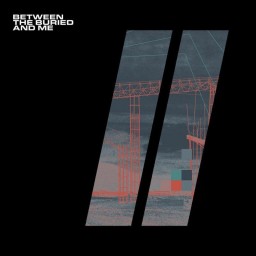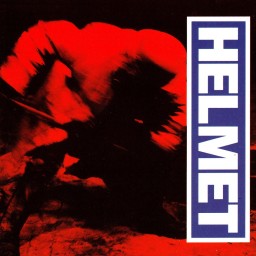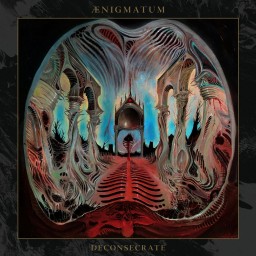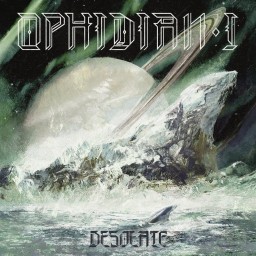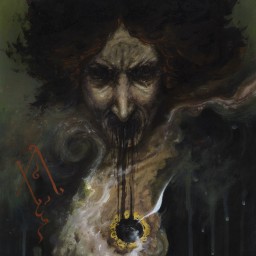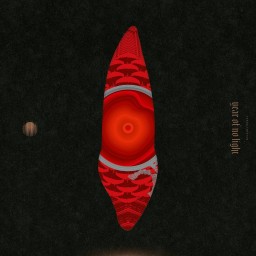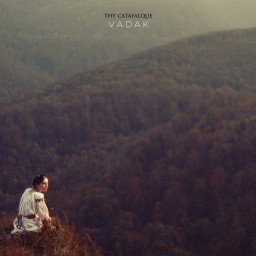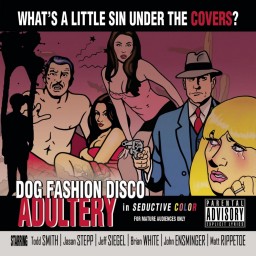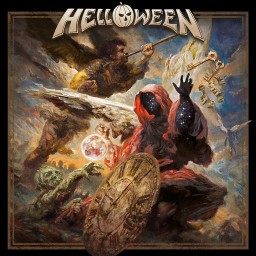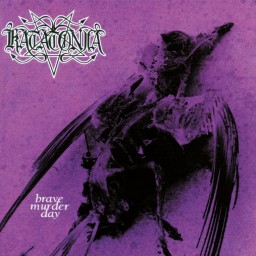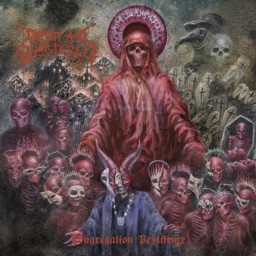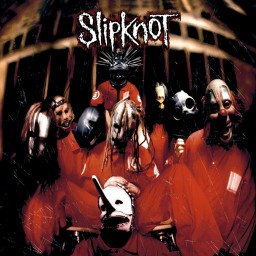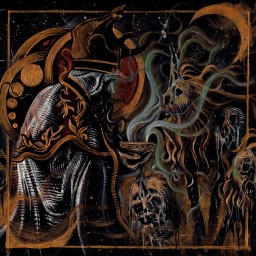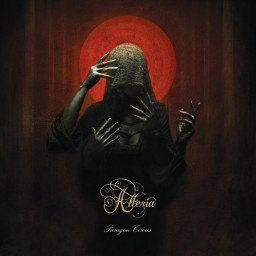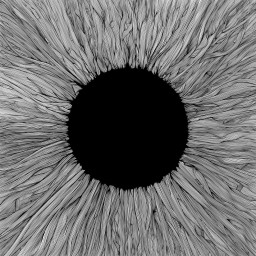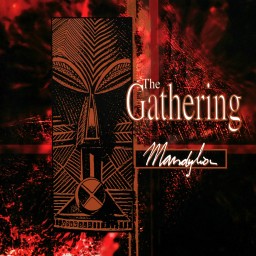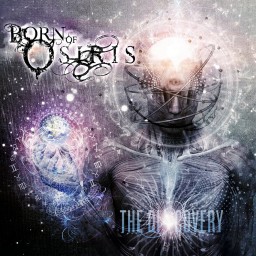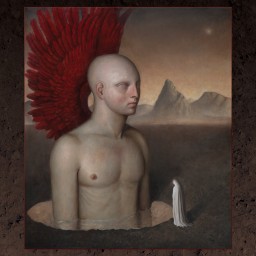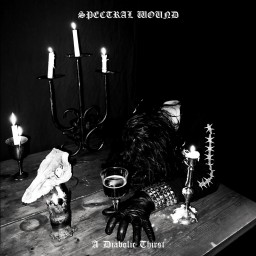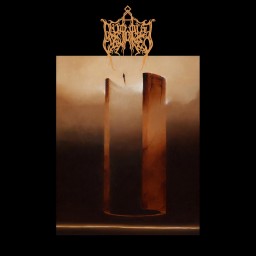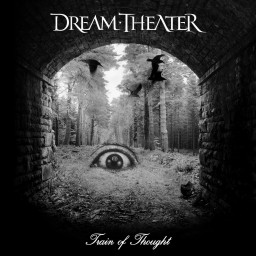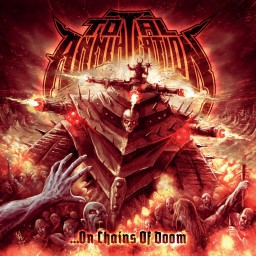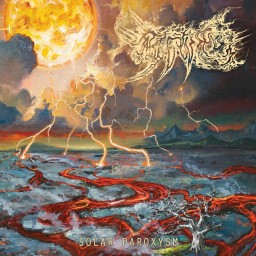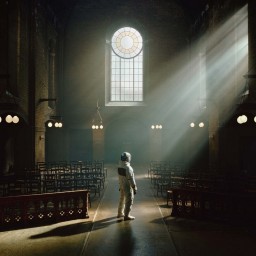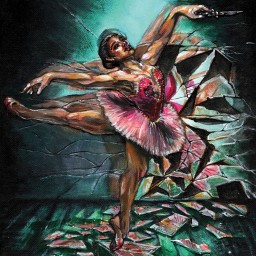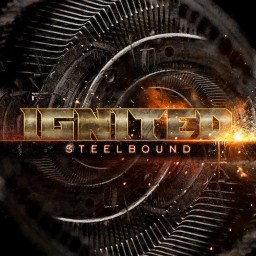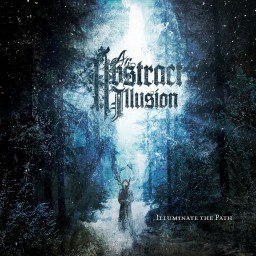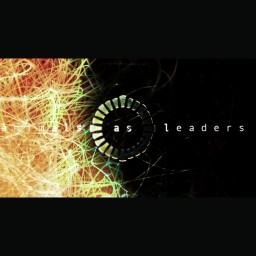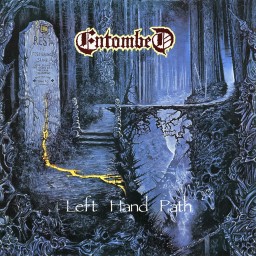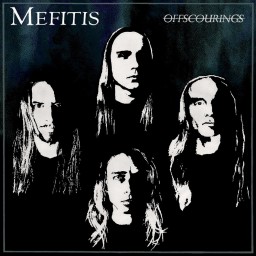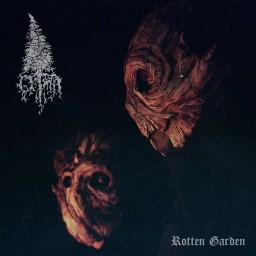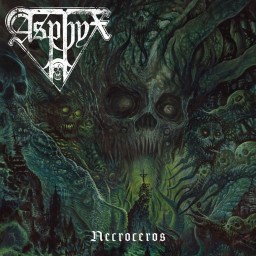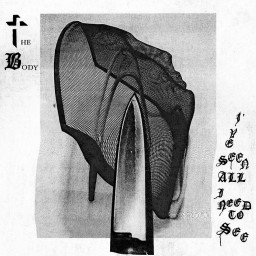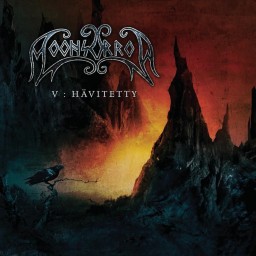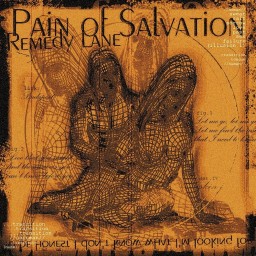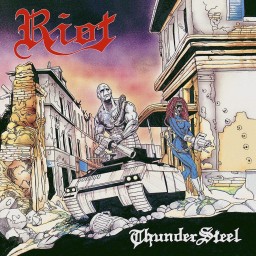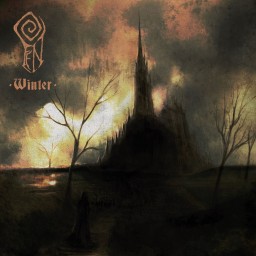Saxy S's Reviews
I don't want to come on here and hate on funeral doom. It makes a lot of sense given the crushing atmosphere that is implied by the subject matter that it sounds like a dirge and gives you the crushing feeling of being lowered six feet underground. But holy shit is it boring! And this is not just a criticism of Monolithe, but many of this genre's most influential figures, like Bell Witch and Esoteric.
This album took me three attempts to finally get through it in a single sitting. And trust me when I say this: it was almost a fourth attempt because I was so drowsy and uninvolved in the music that was on display, but I forced myself to continue listening through to its deathly conclusion. I am not opposed to single track albums; Light of Day, Day of Darkness is one of my favourite records of all time. But Green Carnation had something that Monolithe desperately lack, and that is a sense of growth, or in the case of funeral doom, decay. It took this album nearly half and hour before it decided to modulate out of its main theme. Leading up to this, Monolithe waste time by having moments that seem like a divergence from the original theme, but only serve as temporary bridges from theme A to... theme A again. There is so much obvious room for refinement and cutting of the fat that this could have worked, but instead, Monolithe are convinced that long, unchanging atmosphere can win me over, when it actually makes me want to go to bed!
I feel horrible for the drummer in this band who does the bare minimum when it comes to tempo support, and is only able to add some occasional double bass and drum fills whenever its time to feed the cat... and the cat died five years ago. The guitar work is okay I guess; most of the record has a rhythm guitar who just chugs away with the lowest power chords, while the lead guitar sounds more like a continuous solo instead of a melodic lead to compliment the synth and vocals. And while I did enjoy the synths on this album, the vocals are so far back in the overall mix that you would be hard pressed to hear them if you weren't using headphones. And the low end of this album is severely lacking; the rhythm guitar is so prominent in the mix with its power chords that the bass has nowhere to breathe. It makes an album that is supposed to be dense and concaving feel remarkably timid.
For the death doom sound specifically, I am reminded of records like The Call of the Wretched Sea by Ahab and Songs From the North by Swallow the Sun. These albums are long, brooding and atmospheric as well, but these records both had the songwriting presence to lead you down the dark and terrifying path and bring you somewhere that is colder and more isolated than where you started. The Monolithe albums hear the starting gun go off, trip before the first hurdle, and then don't even attempt to get back up and try to finish the race; they stay in place. I'm generally not one to criticize an album that typically receives glowing praise, regardless of genre, but I just cannot tolerate this. If you ever wanted to know why my ventures into funeral doom metal are tepid, I present exhibit A.
Genres: Doom Metal
Format: Album
Year: 2005
It's time to have the BTBAM conversa... wait I did that review already!
Okay, all joking aside, when I posted my review of Between The Buried And Me’s 2007 album Colors only a week ago, I figured that it was important for me to air out what I thought about that album, as well as how it helped shape an entire new subgenre of music that I previously actively avoided in technical death metal.
But when BTBAM started to drop more and more of its tech-death edge with Coma Ecliptic and the Automata album from 2018, the albums became more hook heavy, but lost more of the bands identity from the 2000s. And I was shocked when the band announced Colors II, which implied a return to their technical and metalcore roots.
And for a band that knows how excellent Colors is, is it not surprising that many of that album's most iconic elements are not here? The guitars are not as sprawling, the songwriting feels less developed, and from an overall sound design perspective, Colors II has a lot of empty passages that feel hollow and pad this album’s already inflated runtime.
This album absolutely sounds like fan service; Tommy Rogers has more harsh vocals on this album than anything BTBAM have released since Parallax II: Future Sequence, Blake Richardson is back doing Blake Richardson things behind the drum kit, and the songwriting has a significantly greater emphasis on time modulation and rapid changes through musical motifs. But this time around, this band has the benefit of a pool of lighter sounding progressive metal albums to build from. While the first Colors album was a refinement of the band's progressive/technical sound, this album feels like the band is trying to refine and hybridize their old technical sound alongside their melodic progressive metal of the 2010s.
The only problem is that this album feels too avant-garde and obtuse to be a sequel to Colors. For a band that knows how great an album that is, so much so that they have toured that album in its entirety multiple times, why would they bother with rasta horns on “The Double Helix of Extinction”, or the saturday morning cartoon sound effects on the bridge of “Prehistory”? And on “Bad Habits”, the use of obviously synthetic choirs is alienating and off putting to me. These feel more quirky than thoughtful inclusions (although in the case of “The Double Helix of Extinction” I do not know how rasta horns can be used seriously).
This might be an overly harsh review of Colors II, but I still do like this record. I don’t know if I enjoy it as much as Coma Ecliptic, but it is nice to hear a band that has continued to lighten up in recent years give us a nice throwback and reminder that they might not be completely done with that sound yet. However, I would be lying if I didn’t say that Between The Buried And Me have lost some of their vibrance in the years since Colors.
Genres: Metalcore Progressive Metal
Format: Album
Year: 2021
Meantime by Helmet is an album of two tales. On one hand you have the more ruckus songwriting of "Iron Head" and "Turned Out", and on the other you have the more accessible version of alternative metal that gave us songs like "Role Model" and of course the big promo single "Unsung". In both cases, these songs are mixed very well with a clear emphasis on the grunge aspect. Guitar parts are muddy, even though the bass lines are well developed. And the percussion has a distinct punk sound to it that had me reckoning back to Minutemen's Double Nickels On The Dime. Page Hamilton's vocals range anywhere from Zach de la Rocha screams to a cooled out Ozzy Osbourne impersonation on "Unsung".
The sounds are impressive and still sound fresh almost thirty years later. I think that this album's biggest flaw is how often it flip flops between the two styles mentioned previously, and while that doesn't bother me as much as it does some other reviewers, I can admit that it does get irritating at times when it is clear that Helmet want to go for broke with a full hardcore punk/metal sound, but feel restrained by record label requirements and promotional singles. This album has more reference points to a band such as Big Black than anything that RATM, Alice in Chains or Tool were doing around the same time. And while I do like this sound, I feel like Meantime could have shot higher.
Genres: Alternative Metal
Format: Album
Year: 1992
A couple of weeks ago, I briefly spoke about the new Ophidian I album and described it as a fairly decent blending of melodic and technical death metal, even if for me personally, the technical portion exhibited far too much of the foreground. Ænigmatum's album now asks what would this sound like it the focus was reversed?
I find Deconsecrate to be engaging in its technicality, but not holding onto the wankery prominent in technical death for very long phrases. "Disenthralled" and "Fracturing Proclivity" have very good balancing acts and the group does a solid job of making these tracks feel connected. Themes are sparse, but are developed throughout the track runtimes. Furthermore, themes are not kept divided based on which side of the melo-tech see-saw you're on; in fact, themes are regularly transformed between the two sections, and not making the opposing sections feel like glorified interludes.
The mixing is very good. The vocals reminded me heavily of Dying Fetus' John Gallagher. The guitars are heavy and melodic, and provide some much needed counterpoint to the fruitful and progressive bass that has plenty of room to breathe for melodies as well as some solo breaks. Percussion is top notch; there is a lot of double bass on this album, so it becomes very important that it won't become overbearing. Beyond that, the technical wizardry of Pierce Williams is wonderful as they make huge blast beats and extended drum fills.
Unfortunately for this album, it has two major flaws. The first is because of the loss of a true rhythm guitar, sections of this record fall flat. In all honesty, it feels more like a "you win some, you lose some" scenario; depends on the track. The other big issue is that in comparison to other prominent progressive death metal bands (Rivers of Nihil, Rannoch, An Abstract Illusion), there isn't very much that makes this record stand out by comparison. Whether that be the use of soaring melodic passages, or an uncommon musical instrument, this feels a little too predictable. I do like the tones on display here, but what really makes this record a cut above the progressive death metal albums from Alkaloid or The Faceless?
For me, I can see where Ænigmatum are coming from and I did enjoy Deconsecrate. While the melodic and technical sides of death metal are meshed well together, the record is mostly propped up by some excellent songwriting and production. However, without a truly distinguishing feature, I fear that Ænigmatum may get left behind in the annals of progressive death metal.
Genres: Death Metal Progressive Metal
Format: Album
Year: 2021
If death metal can be written on a spectrum and on one end you have the most filthy, brutal death metal of Cryptopsy, Nile, and Dying Fetus, and on the other side of the aisle is the slower, melodic grooves of In Flames, Insomnium and Dark Tranquility (where I comfortably reside), then Ophidian I is the band trying to bring these variations in style a little bit closer together. The melodic stylings of the guitars highlighting a monstrous fundamental with blast beats galore and palm muted rhythm guitars, and a riveting vocal performance from John Olgeirsson. The album sounds nice and the bass presence is brimming with intensity. But I have to admit: this album goes a little bit too hard for my personal preference. Many of the melodic phrases sound more like scale warmups rather than a cohesive idea. It almost reminds me of when I was in school and every single student thought that they could write a tune, but instead of creating a melody that was memorable for the listener, they rather focused on how many notes you could fit into a short period of time. There are a lot of similarities between Ophidian I and the band Rings of Saturn. I would presume that those who appreciate the more technical side of death metal will find more to like out of this than me.
Genres: Death Metal
Format: Album
Year: 2021
As I prepare to enter into my fourth decade on this planet, I'm continually asking myself whether or not I have gotten soft in recent years? As the years go by, thrash metal has become a dead genre to me; what used to be full of life and nonstop energy, now I view it as a black hole of empty chugging and solos, lacking in grooves and melodies and bands devoid of originality and would rather just copy the golden era of thrash of the 1980s. Even more so, my favour with those bands (i.e. Megadeth, Slayer, Metallica) has also faded as they have become tiresome and boring. And as I have grown into extreme metal genres like death/black metal, most of my favourite albums are of the melodic and atmospheric variety. For as epic as Saor and Panopticon albums sound, they won't be winning any "most brutal breakdown of all time" awards anytime soon.
With that being said, I recently gave The Dreaming I by American duo Akhlys a spin and... well I think it is safe to say that my suspicions might be true, but goddamn does Akhlys make the realm of Hades sound like a pretty awesome vacation spot! This is a marvelous record that takes the atmospheric and melodic side of black metal and combines it with some filthy grooves and riffs for one of the most impressive hybrids that I have heard in quite some time.
Whereas most of my black metal is of the open, soaring variety, Akhlys use the atmo-black sound to create a soundscape that resembles the floor opening up below your feet as you are dragged down into the abyss. The extended ambient intro of "Breath and Leviathan" sets the ominous mood right out of the gate, before what can only be compared to a B-list horror movie jumpscare, the serial killer pops up around the corner wielding their perfectly sharpened machete ready to murder you. The wall of sound black metal is sudden and shocking, and may increase your heart rate!
And if that doesn't scare you enough, the chase scene will. This black metal sound is relentless and is complimented by some fantastic sounding lead guitars and a dazzling vocal performance. The way in which this duo is able to effortlessly match their ambient interludes and atmo-black passages is both technically impressive and compositionally sound as they play off one another to create wonderful dichotomy's for cooldowns and making the wall of sound hit that much harder.
While this album is impressive, it does have a little bit of a length problem, in which some songs sound like they begin to lose momentum and would rather fade out to their conclusion, rather than with a full stop, perhaps signaling the end of the road. But perhaps the lack of an ending shows a group that would have you believe that their is no end to this path; it persists far beyond the end of a single song. However, "Consumation" has a definitive ending, but then proceeds to go on another two/three minute ambient outro and it feels out of place.
But forget the minor issues surrounding the length and how songs end! The intros and body are exquisite and the production is spectacular; the bass lines are very prominent adding to the depth. In the end, Akhlys' album The Dreaming I helps to restore my faith (however slightly) in the most extreme metal to still invoke a positive reaction out of me.
Genres: Black Metal
Format: Album
Year: 2015
Trance Music, but not Transcendent
Year of No Light founded a diamond in the rough in 2010 with Ausserwelt as they managed to win over a lot of folks with its crushing atmosphere. I was unfortunately not apart of that group, but I could, at the very least, recognize its quality in both its performance as well as the execution. But Year of No Light have always proven to be more of a texture first, everything else second band and this new album, Consolamentum is no different. These grooves are slow and brooding with a lot of comparisons to the heaviest side of doom metal. But without anything that resembles a theme or idea, it all just blends together. There are some cool moments on "Alètheia" and "Réalgar", but they do not serve a purpose much beyond that. Furthermore, the instrumentals have grown dull; I found myself losing interest during the wall of sound outro of "Came", meanwhile, the lack of a true bass presence really bothers me since it brings tracks like "Objuration" to a screeching halt. By comparison to Amenera that I just reviewed yesterday, I cannot see myself returning to this Year of No Light album very often. Not that I would want to return to the cold and dark world in the first place...
Genres: Post-Metal
Format: Album
Year: 2021
There is something that must be said about bands like Thy Catafalque. nearing twenty-five years into their musical endeavors and answering the call to raise the bar with every subsequent release. Many people believe that Rengeteg is the culmination of what this band is capable of, but I would like to challenge that claim with the bands newest album, Vadak.
Calling Thy Catafalque black metal in 2021 is grossly misleading as their is not a lot that would imply such a sound. Sure, the band begun making symphonic and avant-garde black metal, but those tones have been replaced by progressive songwriting in addition to all of the folk touches. However, in comparison to the bands excellent 2020 album, Naiv, Thy Catafalque brought back some heavier tones that are far more in line with thrash metal and sometimes groove metal. The stellar combo of "Gömböc" and "Az energiamegmaradás törvénye" is brimming with life and energy; the main riffs are filthy and the vocals and lead soar as complimentary pieces that mesh remarkably well.
Of course, this album is still progressive in nature, so thrash adjacent grooves aren't the only thing on display. "Móló" and the title track are slow burners with some ethereal moments. I got a huge kick out of the main synth ostinato during the second half of "Móló" and the prominent use of horns as melodic instruments during "A kupolaváros titka" and the title track are spectacular.
When I look back on progressive music in twenty years from now, and I think of about the essence of what it means to be progressive, Thy Catafalque will most likely be the first name that comes to mind. Their forward thinking approach to songwriting is intoxicating, but never feels overindulgent. Whereas Naiv had a tendency to get a little same-y at times, Vadak suffers none of that. The sound of this album is stellar for as much that is going on sonically, and the band balances it all with such precision. And this may be the best sounding thrash metal that I've heard in almost ten years! This is the one to beat in 2021 folks.
Genres: Avant-Garde Metal Progressive Metal
Format: Album
Year: 2021
I have repeatedly stood up for both Mike Patton and Devin Townsend on this website, even when these artists are at their creative worst, because they traverse far beyond simple binary genre tags/descriptors. Dog Fashion Disco is another group that could easily fall into that mix. And nowhere is this comparison more appropriate than on the bands 2006 album Adultery.
Now to be fair, the comparison to Devin Townsend off the top is less so in the sound of this album and more so due to its compositional style. The sound of this album is absolutely Mike Patton worship, or more specifically, Mr. Bungle. The heavier portions are complimented by smooth jazz and ska portions that would seem remarkably out of place on basically any other album by any other artist. But here, Dog Fashion Disco found a way for these ideas to somehow flow into each other without the use of whiplash transitions or hard stops. And unlike Mr. Bungle, DFD manages to pull these off in about half of the time.
As for the Avant-Garde tag, I think it is well justified given these songs with their frantic nature. But by comparison to Mr. Bungle, this feels more accessible and welcoming to those who are just trying to get their feet wet in the absolutely absurd. Songs like "The Darkest Days" and "100 Suicides" are meshed well with some cool interludes that continue to play into those main themes, but have enough unique characteristics to add to the quirkiness. And the "technical difficulties" interlude on "The Hitchhiker" literally had me jumping out of my seat with how good it was pulled off!
But like with all quirky albums such as this, your enjoyment will be dependent on how much nonsense you can tolerate. This album has an excess of filler. And while I might really enjoy the early album combo of "Sweet Insanity" and "Desert Grave", I cannot uncover any compositional circumstances for the smooth jazz interlude of "Private Eye", and then ending the album with "Adultery" and "Mature Audiences Only". The last of those getting special mention for featuring a supposed "chilling" conclusion, that is inaudible because the strings are mixed so damn close to the front!
I still do like Mr. Bungle and the comparisons to that group on this band/album have not rung hollow on me. This is absolutely diet Mr. Bungle, but that might not be a bad thing. After all, Mr. Bungle is heavily criticized for being too strange. DFD are not clear of this criticism themselves, especially from a production point of view. But they do avant-garde music in a way that includes better compositions than Mr. Bungle, memorable song structures, and a chilling concept.
Genres: Alternative Metal Avant-Garde Metal
Format: Album
Year: 2006
OK, one only has to see the name Helloween on the front of a new album package to know exactly what they are getting themselves into. This legendary German band are the OG's of Power Metal, so expecting anything more than a pure Power epic and you're going to be heavily disappointed. And while I personally prefer their heir's to the throne in Blind Guardian, I have always had a least a soft spot for Helloween; more of a respect thing rather than outright liking them.
So going into this new album with zero expectations was probably the best thing I could have done because this album is a ton of fun. The compositions on this record are heavy and driving with more than enough deviances and asides to make it memorable. The production of this record is spot on, highlighting the vocals of Michael Kiske, Kai Hansen and Andi Deris, the guitar work is very solid and solos are given plenty of space to soar. The bass work is of course, secondary to the guitar riffs, but its presence in the mix gives this album some much needed gravitas.
Michael Kiske also seems to have taken some songwriting lessons from Tobias Sammet with their work in Avantasia. There is some slight touches of progressive songwriting scattered throughout the album that I appreciated. But what I really enjoyed is the free form concept. It makes for a far more enjoyable experience, both as a complete album as well as in single fragments. To summarize my thoughts on this album: if you aren't a fan of power metal, this record is not going to change your mind. Otherwise, this is a legacy album by a band that has been together for forty years and I haven't had this much fun with a legacy album since Judas Priest's Firepower.
...Oh yeah, and "Robot King" might be one of the best songs Helloween have ever made, and no I'm not sorry!
Genres: Power Metal
Format: Album
Year: 2021
One of the great things about Death Doom/Gothic Metal is how it incorporates atmosphere and texture into the music; not to overshadow the songwriting, but to compliment it. This is what allows for the stellar albums by artists such as My Dying Bride, Paradise Lost, Swallow the Sun, etc. to resonate with such frequency for me. Meanwhile, the earliest Katatonia records that incorporated this sound may have some nice texture and the songs lure the listener into a trance, but nothing about the individual songs stand out. In fact, I find Brave Murder Day to be a monotonous album.
The album kicks off with a ten minute opener, "Brave" that sees the group embark on a ten minute dirge that is devoid of structure or form. The use of one riff unaltered and unedited throughout the duration is mind numbing. And while it sounds nice from a production point of view, there is no good reason for me to traverse further into the song. This songwriting technique persists into the next song "Murder" as well as "Rainroom" and for the life of me, I couldn't tell you the distinguishing features between these two tracks. These two songs are broken up by the slower and cleaner "Day", which is a good change of pace, but it follows in step with the others with its songwriting technique. It feels too much like Katatonia took composition lessons from Drone Metal.
"12" actually has a form to it and does not sound like it is just borrowing the same riff from the previous four tracks, making it a standout. The closer "Endtime" starts with promise, but eventually just modulates back into same tempo/riff/melody that I've already heard far too much of for a relatively brief forty minute album.
In the end, I liken Brave Murder Day to a modern day Harakari for the Sky album. These albums are loaded with texture and atmosphere and they sound beautiful, but the songwriting is so painfully lacking in any development or structure that my attempts to latch on to any melody or groove is gutted when the artist refuse to do anything with them. I found that, following this album and the band began ditching the Death Metal adjacent tones for more Alternative rock, while still maintaining their Doom/Gothic aura, it opened up many more opportunities for them as songwriters. I for one am glad, alongside Within Temptation, that they dropped this sound as quickly as they did.
Genres: Doom Metal
Format: Album
Year: 1996
Mixing that highlights the percussion, non-existent songwriting structures, and music that focuses on technical wankery rather than groove of melody? With my continued growing interest in Ulcerate in recent years, it becomes too obvious when tech death bands cannot come close to matching that groups efficiency. This is 100% music not made for me, but if you have an interest in highly aggressive, poorly mixed death metal...you can do a lot better.
Genres: Death Metal
Format: Album
Year: 2021
Before the turn of the century, Nu Metal was only beginning to get its feet wet. Bands like Korn, Deftones and the like were taking alternative metal and making it darker; lots of heavier grooves, harsher vocals and typically immature subject matter. At the time of the self titled debut, Slipknot were a novelty and were considered too heavy for nu metal. And for a group that consisted of nine unique contributors, this could only be viewed at the time as a novelty. And going back and listening to the self titled album once again, over twenty years later after the passing of drummer Joey Jordison (RIP) that my suspicions remain fully intact. This album is absolutely a product of its time and I find it not a surprise as to why so many (pre-)teens flocked to this record and this band.
It is no surprise to hear the songwriting influence on this album from Korn and their self titled debut. It sounds very rough and unfiltered, the guitars are almost exclusively restrained to chugging groove riffs and power chords, the percussion by Joey Jordison is technically impressive, but sounds like ass when the bass drum is as close to the front of the mix, while the tinny snare is compressed. Now this may be due to Slipknot having three distinct percussionists and together they make the snare drums sound like trash...literally. The gang vocals add some much needed force to these songs, but feel overbearing, as do the sampling and turntables. It all just comes together to form the equivalent of musical mush.
This album has nothing outside of its texture of loud, angry and hateful that makes any of its songs stand out. The only song that has some sort of a cooldown is "Spit it Out", but the compression throughout just sounds awful. Corey Taylor's screaming vocals are overbearing, and the sung vocals are hilariously bad, with the rap vocals being not much better. This may be a controversial hot take, but I much prefer the earlier Stone Sour albums from '02 and '06 to early Slipknot. It's hard to believe that Corey Taylor was in his late twenties when this debut was recorded, because it sounds like an album that could have been made by a thirteen year old who didn't get his allowance money this week. Not a good debut by any stretch and it's quite surprising to see so many people give this record, much like Korn's debut, a free pass.
Genres: Alternative Metal
Format: Album
Year: 1999
Usually when I listen to my folk/pagan inspired atmospheric black metal and blackgaze, there is a certain level of uplifting nature to the music that is to be expected. For a genre that is typically so dark and cold, hearing soaring melodic passages in the guitars or other melodic instruments, it can make black metal sound comforting. Violet Cold starts off Empire of Love with one of the most unapologetically happy black metal tunes I've ever heard with "Pride". The alternating male/female vocals, the warm guitars that are brimming with major key signatures, and a rock solid foundation left me very excited to hear if this artist could maintain that momentum.
Unfortunately they don't. As this album progressed, I started to pick up on a lot of trends and other more recognizable blackgaze names (Alcest, Deafheaven, etc.) that Violet Cold were borrowing from. The major harmonies started to dampen into more minor tones, the vocal timbres started to become less pronounced, and songs in general began to lose their identity. For as much as I did not like the electronic infused percussion of "Be Like Magic", at least it was original and it definitely stood out amongst a crowd. It was also one of only two brief moments where it was used. A further exploration could have made it more memorable, as well as justified their existence if they were to have been implemented into the compositions smoother.
"We Met During The Revolution" has a sweet sounding bridge that includes a melodic guitar passage that sounded like something out of a Plini or Sithu Aye record. Despite the mixing of this lead being very imbalanced, the change of pace was very cool. The banjo lead on the instrumental "Working Class" was cool, as well as being the most black metal song on this entire record. And of course, I would be remised if I didn't mention the Middle Eastern influence, as is evidenced by the moon and star of the Islamic flag, overlaying an LGBT flag on the cover art.
Empire of Love is not a black metal record. Sure, it has occasional blast beats, harsh screams and pretty tremolo picking in the guitars, but these are secondary to the predominant post-rock and shoegaze. And I do think this record is pretty, but it left me wanting more. Violet Cold quickly ran out of ideas with this record and the ebullient opener was proven to be unsustainable. This is an album the promised the world as a new post-metal/blackgaze experience, but couldn't get its influences out of the way.
Genres: Black Metal
Format: Album
Year: 2021
Brazilian based Papangu's debut LP is quite the daunting task for a band just trying to get their feet wet. It's a sludge metal album that is littered with post-metal and psychedelic songwriting techniques and tells quite the tale conceptually. Like with Gojira, these themes are heavily focused on environmentalism, but they are more reminiscent of the Buddhist tale of Kisa Gotami; a character who tried to defy fate, and failed spectacularly in their attempts to stop it. However, Gotami eventually understood that fate was inevitable and succumbed to its grasp. Papangu meanwhile try to defy fate, fail, and then attempt to undo their wrongdoing, leading to further chaos. It makes for a growing listen that starts formulaic. But as the tracks get longer, the forms become less structured and spiral out of control.
Instrumentally, the music is psychedelic so themes are sparse and the fuzzy guitar take you along a journey that is as captivating as the story itself. Vocals alternate between cultist chants and quasi-black metal screeches, although the screeching vocals are held back in the mix considerably. Saxophone during the last two tracks was a welcome surprise, but by this point in the record, the chaos theory have grown exponentially, so the sax does not have a real distinctive theme to connect these longer songs together.
I kept thinking back to Alphaville by Imperial Triumphant from last year while listening to this, but I.T. are a death metal band, and the frantic nature of that subgenre of metal felt a lot more appropriate for this kind of nihilistic, end of the world concept. Whereas with a lot of psychedelic music recently from XIXA and King Gizzard and the Lizard Wizard, it feels more like hippie singing around a campfire, while not really doing anything about our crumbling world. This hits with more authority than those other two names mentioned, but it still holds less weight than other metal albums, and more recently, Imperial Triumphant.
Genres: Avant-Garde Metal
Format: Album
Year: 2021
It takes a lot of work for new progressive acts to impress me. It seems like the further we move away from classic albums in this vein (Images And Words, Blackwater Park, Light of Day, Day of Darkness) the lexicon of progressive music, and progressive metal more specifically, has become incredibly stale. You either have bands that know how to write songs, but are unabashed in their worship for those iconic artists, and become incredibly forgettable as a result. Or you have technical wankery that is less concerned with songwriting and craftsmanship, and more so the virtuosity, which... is incredibly forgettable as a result. The later of those two descriptions is especially true today with the incorporation of djent as a prominent progressive metal subgenre.
I discovered Paragon Circus on a Bandcamp recommendation late in 2019 not expecting much, as is the case with most albums that are released late in the year or early in the next. I was not expecting the level of detail that this French group would put on display; an album that is well in debt to bands like Opeth if they continued to make Blackwater Park compositions with their new progressive rock sound, while doing it in such a way that is not only unique to Altesia, but also incredibly precise. This is an album that began with no expectations, and shot up my favourite albums of 2019 list in record time. This album hit me like Veil of Imagination by Wilderun and that's high praise!
Nowhere is this display of songwriting more apparent than on the second track "Reminiscence". This song has many different musical phrases on display, but they all feel like they belong to the whole. The technical soloing by Idler during the introduction creates the framework for the rest of the tune, the main theme is introduced and is further developed through style changes, vocals, djent riffs and even jazz-y saxophone solos! This song shows a band that has been listening to a lot of Opeth, but has refined the compositions to near perfection!
Many reviewers sight this album as being remarkably redundant towards mid 2000s Opeth. And while the influence of that band is on full display here on Paragon Circus, it is remarkably ignorant to the copious amounts of forward thinking on display. I already mentioned that this album sounds like a mid 2000s Opeth record combined with the sound of Pale Communion, but the compositions are far more complex, and the development of those themes are very impressive. Furthermore, unlike a mid 2000s Opeth record, this album contains an abundance of brighter tones in the leads as well as fundamentals; more major harmonies and soaring melodies are among just some of the traits that make this record stand out among its influences.
The rubato piano intro that opens "Hex Reverse" is beautiful, leading into a gradual buildup throughout the track, as vocals and lead guitar alternate never outshining one another, culminating in a final refrain with both simultaneously at their peak and it sounds awesome! "Amidst the Smoke" is probably the most accessible song here; maintaining its pace throughout, but subtly changing between different themes so effortlessly that you might not even notice! And the way this album ends with "Cassandra's Prophecy"? I'm usually quite pessimistic when it comes to 10+ minute tunes on the best of days, and this album has already defied those expectations...twice! But at almost eighteen minutes, there is no way Altesia can keep the momentum going right? The way Altesia takes such a simple two note motif and mutates it, and the outro solo being the ultimate culmination of the entire project, without feeling over-indulgent, is something that I will hold on to for a very long time.
This albums main weakness for me, like with a lot of progressive albums, is the synthetic instrumental choices. This most notable on the outro to "Reminiscence" and the intro of "Amidst the Smoke". Many of them sound very thin in comparison to the larger string/choral synths that persist throughout this albums larger portions. Beyond that, it is really difficult to critique the production on this album. The guitars have a pin point precision when it comes to having just the right amount of dynamic without interfering with this albums spectacular low end. It is not flashy by any stretch of the imagination, but the bass lines are heavily pronounced, even during the records most emphatic moments. Like with the guitars, the percussion is expertly produced and performed; only giving more when necessary and never overpowering the lead. Meanwhile, Clément Darrieu's vocals rival those of Tommy Rogers of Between The Buried And Me and shows off more vocal range, which does include some altissimo, which may take some time to get used to, but they occur late on the record and are complimented by growled vocals effortlessly.
As I said off the top, progressive music in the modern day has a difficult challenge that many other genres don't. By nature, it is music that is supposed to be forward thinking and is willing to take risks at the expense of accessibility. Modern progressive metal would rather be too technical or just copy Scenes From A Memory/Images and Words into oblivion. Altesia is the band that are willing to challenge that claim. It may be redundant of one progressive metal giant in particular, but it does more than enough of its own to make it standout beyond just another Opeth clone. The songwriting is impeccable, the progressive elements are not self-indulgent, and the concept is truly awesome for a debut. This is one carnival that I am thrilled to go to again.
Genres: Progressive Metal
Format: Album
Year: 2019
I was fortunate enough to get on board with VOLA right out of the gate in 2015 with their debut LP Inmazes. That was an album that displayed a new group attempting to blend the technical prowess of Djent and combine it with fairly accessible alternative metal tones and hooks that really fascinated me. Unfortunately this momentum may have been short lived, and even though the follow-up record, Applause Of A Distant Cloud and the new LP Witness are still quite solid albums, it does tend to fall into some very tired trends in modern progressive metal.
The synth work is jittery throughout the album, alternating between being very frontal and tinny on “These Black Claws” and “Head Mounted Sideways”, to being implemented quite well on “24 Light-Years” amongst the open chordal guitar accompaniment. The bass work is not revolutionary, but its presence does make the tracks feel a little more full, especially on the mid album ballad “Freak”, but on other instances, most notably “These Black Claws” once again as well as “Stone Leader Falling Down”, the bass lines seem like an afterthought and are not balanced as well with the down tuned guitars.
The hooks on this record are quite pretty, continuing a trend that VOLA have had since their debut. “Straight Lines”, “24 Light-Years” and especially “Napalm” have simple but very effective melodic motifs and are complimented well by some progressive compositions; not so much with whipping between time signatures but rather less emphasis on the strong beats in a traditional common time.
If anything I can give credit to VOLA for consistency and having a very good idea and rolling with it...and that has worked out for them up to this point. But those of us who have heard this sound before know that it is getting tiresome at this point, and VOLA are going to need to experiment further in order to maintain relevance on subsequent releases.
Genres: Progressive Metal
Format: Album
Year: 2021
The Uroboros (or as it is typically referred to in the English language as "Ouroboros") is the image of a snake swallowing its own tail as a symbol of the infinite; an object with no discernable start or end point. I think that from a completely compositional standpoint, Dir en Grey's classic 2008 album has a significant problem where it tries to swallow more than it can physically chew. This band who began as an alternative rock/metal band with elements of nu-metal decided to go off the rails with this album and create something that has influences from so many different places: thrash metal, visual kei, death metal, industrial music, and compositions that borrow a lot from progressive and avant-garde music. That alone might make one question whether or not this belongs under the alternative metal tag at all!
While there may be some elements that resemble funk and post-hardcore, this album feels nothing like any of those genre representations. They feel more like temporary passing elements on what I can only assume the band perceives as a conceptual musical journey. And it all felt so jarring to me! What it reminded me of the most was last years album I Let It In And It Took Everything by English based Loathe, even if to a lesser extent. With that album, it tried to split the difference between pummeling metalcore and Deftones-esque shoegaze. And the strangest part of all is that I enjoyed that shoegaze/alternative metal sound more than the hardcore stuff! I think Uroboros falls into a lot of the same jurisdictions for me. Songs like "Toguro" and "Bugaboo" are wonderful displays of how progressive music can be made "accessible". The later of those being quite significant since it has a riff that is almost a blatant flip of Dirt era Alice In Chains!
But the rest of it? I could care less! The album starts off on terrible footing with the extended "Vinushka", an extended wank fest with no direction. That carried into "Red Soil" and "Doukoku To Sarinu" before collecting themselves and actually creating a decent hook/groove for "Toguro". "Gaika, Chinmoku Ga Nemurukoro" is a straight up death metal song before "Dozing Green" and "Inconvenient Ideal" brings back some of that visual kei and gothic trends. If that sounds like a lot to digest...it's because it is. And while most of it is produced well, the significantly heavier stuff does have a big problem of highlighting the percussion bass drum rather than the fundamental bass parts.
I would assume that if you appreciate progressive/avant-garde music as much as I do, this constant genre swapping might not bother you as much as many others. But for those approaching this as another Dir En Grey album are going to be alarmed by the balancing act. But that still isn't going to keep me from pointing out all of the inconsistencies in both the songwriting as well as production throughout. This will certainly serve as a "find the songs you like" album for most, but the good stuff is of such top quality that it still sees Uroboros sinking further between the teeth.
Genres: Alternative Metal Avant-Garde Metal Progressive Metal
Format: Album
Year: 2008
Where do I start when talking about The Gathering? In terms of gothic metal coming out of the mid to late 1990s, they are one of the groups frequently left behind in a slew of male fronted bands like My Dying Bride, Type O Negative and Paradise Lost. It certainly shouldn't be the case when you consider Anneke van Giersbergen is a truly magnificent voice in gothic metal, as well as the many guest appearances throughout the years in both power metal and progressive metal. And the sound of this album helped influence some of my favourite gothic/doom metal albums of all time, such as Swallow the Sun and Trees of Eternity with its heavy use of darkwave.
And what we end up with on Mandylion is a solid display of control. Anneke could have easily played the "I'm a woman in metal" card and gone for the bombastic, symphonic vocals of Within Temptation's Sharon den Adel that were used two years later on Enter, but rather we have a plainspoken delivery that sounds blunt and bleak, while still allowing for copious amounts of technical proficiency. And what's backing her up? A well balanced, heavily focused doom metal palette that does go heavy on the texture and atmospherics rather than hook or melody, but they are produced with convincing presence and a forward thinking bass line that prevents these sections from becoming played out and uninteresting.
In addition, the songwriting helps with memorability as well. Mandylion is one of the most forward thinking, progressive doom metal albums of the 1990s that I can recall. And yet it features some of the most infectious melodic drives of any of the great 90s doom/gothic metal albums. Anneke's plainspoken delivery makes these songs feel down to earth, as opposed to the bombast of Within Temptation. The drives are simple and match the lyrical content quite well, and many of these songs have a well constructed form making them feel well worth their extended runtimes, especially "Leaves" and "In Motion #2".
In the end, The Gathering are more of a band that I respect more than I like. I will not deny that the quality of Mandylion is very good with its great production and forward thinking songwriting, but I have heard plenty of 2000s and beyond gothic/doom metal that takes the quality of this record and expands upon it. For me, I see this more as a redemption after reviewing (and not very much liking mind you) Within Temptation's debut gothic metal album a couple of years later. I do like this sound and it can be done well. And The Gathering are one of the early influencers of a sound that I really enjoy and respect tremendously.
Genres: Gothic Metal
Format: Album
Year: 1995
Being a fan of progressive metal was a incredibly weird time during the early 2010s. As djent was beginning to be popularized by bands like Animals As Leaders, After the Burial, and Born of Osiris, I found a lot of it to be less engaging. On one hand, you ended up with highly technical music that lacked memorable structures like hooks and melody, and on the other was something that was closer resembling metalcore/deathcore, which... lacked memorable structures like hooks and melody.
I became aware of this new wave of progressive djent in 2010 after discovering what was, for the time, my new favourite band: Periphery. The key here is the record label; Sumerian Records were about to hit on all cylinders to fire out as many metalcore/deathcore and progressive djent bands that they could in a relatively short period of time. Born of Osiris had already established themselves with The New Reign and were about to take the next step in making their sound more progressive. And the end result was something of value, but could have been refined.
For starters, Born of Osiris are clearly influencing Rings of Saturn with some of the technical passages complimented by dissonant guitar leads with pinch harmonics, as well as the spatial passages on songs like "Singularity". As a result, this brand of deathcore is just as technically proficient as the kind of tech-death giants that Rings of Saturn are, while the breakdown passages split the difference between just regular metalcore breakdowns, and the sort of tonal dissonance that one expects from deathcore. Personally, I prefer the passages in which the breakdowns are complimented by some sort of synth lead that is overlaid on top of the metalcore breakdown, which is reminiscent of a band like August Burns Red. However, most of the time, the breakdown is the feature and while they can be quite heavy, they lack substance beyond "breakdown".
As I said before, the songwriting is very reminiscent of early Rings of Saturn with the technical proficiency in the guitars (as well as some percussion). And while the mixing is quite nice, it does fall into many of the same traps that Sumerian albums continuously fell into during the early 2010s. Most notably, the overabundance of guitar in the mix absolutely diminishes the bass, with the lone exception being the mini solo break on the closer "Behold". And while I feel it would be stupid to mention such a thing, given this is what all of this kind of metalcore sounds like, I cannot help but feel let down when the guitar breakdowns are a lot less bass-y than you would expect.
It all makes for a messy album that still has some good moments, but are bogged down by bad production, and my general displeasure for this type of metalcore music. The album runs far too long and does not have nearly enough memorable moments throughout the track listing to make The Discovery anything more than a blip of the radar. It's influence would be significant however, so I can at least be thankful for that.
Genres: Metalcore
Format: Album
Year: 2011
I was surprised by this new Spectral Lore album at first. When I listened to their collaboration with Mare Cognitum last year with Wanderers, Spectral Lore were clearly going for a more spatial and comforting style of atmospheric black metal that was complementary to Mare Cognitum’s contributions that were heavier and faster. Imagine how I felt right out of the gate with all of these heavier blast beat percussion parts and strong tremolo picking guitars.
And this is a sound that would persist throughout the rest of the album. I will admit it does feel a little safe around the start of “Apocalypse”, but it does compliment well with some solid production. The songwriting is top notch; the way in which Spectral Lore is able to craft songs that are elongated and yet still retain a strong level of interconnectivity throughout is commendable. The opener “Ατραπός” starts off with the aformentioned heavier sounds of blast beats and tremolo picking guitars, then after a short break, the tremolo picking returns with slower percussion, followed by more soaring guitar leads. This all works together to create something that works well and warrants its twelve-and-a-half minute runtime. I also like the subtle key change that takes place on “The Sorcerer Above The Clouds”.
Sonically, Spectral Lore borrows clean guitar tones straight out of the more post-metal elements of recent Tool records, the more distorted elements hit with authority, but are also restrained enough as to not hinder the excellent low end and the independence of the bass lines. Much like a Mare Cognitum album, the vocals do feel like an afterthought in the mix, as they seem to be left towards the back behind the guitar leads. When this album is at its worst is when the steady percussion starts to fall off the tracks with the rhythm and lead guitars; at points this record will start to go off kilter and the tempos won’t match up. This is most notable throughout “The Golden Armor” when even the vocals cannot find beat one.
The atmospheric closer “Terean” is a nice touch following the high intensity of six tracks that precede it. It allows for the listener to reflect on the great atmospheric black metal they just experienced and perhaps work up the strength to go another round.
Genres: Black Metal
Format: Album
Year: 2021
Some more black metal, this time from a group from Montreal, QC and playing into some of the more melodic traits of the genre, while still maintaining a high level of aggression and intensity throughout these six songs. And while I do find some of the melodies on this record to sound very nice, they don't vary too much from other songs throughout the rest of the album. Many of them maintain the same tempo, use the same tremolo picking patterns in the guitar (usually in the same octave as well), nonstop blast beat percussion and some solid vocals all around. Outside of a handful of moments, most notably on the closer "Diabolic Immanence", a lot of this record feels like comfortable melodic death metal; good melodic death metal mind you, just very pedestrian. I get the same feeling whenever I listen to a Mgła album. Take that for what it's worth.
Genres: Black Metal
Format: Album
Year: 2021
There is a lot to like coming out of this new wave of technical death metal during the 2020s. It's nice to hear that artists have finally decided to start writing full songs rather than just limited fragments half heartedly spliced together for dramatic whiplash effect. I like how bands have begun incorporating more avant-garde songwriting structures to their music as an additional layer of technical demand. And I really appreciate how much more important bass lines have become, and how independence from the chugging guitar riffs opens up the music to many more possibilities as to where it can go in the future.
And so, this new tech-death duo, Turris Eburnea, are doing what they can do to continue the legacy that has been left behind by bands like Gorguts and Dead Congregation. And I rather enjoy this sludgier, almost post-metal hybrid of extreme technical death metal that sees the band using more guitar leads and well established bass lines, complimenting the chugging rhythm guitars and moving percussion parts. Some of this album resonates in the same way as Ulcerate did last year with Stare Into Death and Be Still. So much so that I could have sworn some of the atmospheric parts of the instrumental "Syncretism Incarnate" were taken directly out of that playbook. The vocals feel a lot less developed and further alienated to the back of the mix on these songs though.
Compositions are quite solid. The opener "Unified Fields" has a unique blend of interconnectivity between its moving parts and doesn't feel like it's being overstuffed with ideas. This carries further into "Cotard Delusion" and the instrumental "Syncretism Incarnate". The closer, "Malachite Mountains" is the the closest to a traditional tech-death song this EP gets and it sounds fine with many of the elements discussed earlier. I just found it to be a little less memorable.
But overall, if I were to call this technical death metal, I feel like I would be being disingenuous. Some might see that comparison and make unfair comparisons. This is avant-garde tech death with an apparent attention to melody that should be commended. I don't know how much more of this I would have been able to tolerate, so the fact that it is a relatively short EP, it gets some bonus points for that as well.
Genres: Death Metal
Format: EP
Year: 2021
There comes a time in every musicians career where they hit a proverbial brick wall in their compositions and their fans begin to turn on them before they become a legacy act. It happened to Iron Maiden, Judas Priest, Anthrax, and even more so recently with a band like Mastodon. In many cases, the pivot happens when a band begins to commercialize their sound for a wider audience. Never has this been more true than the undeserved levels of vitriol that Metallica received with the self titled album from 1991 and the rest of their 90s work.
The same can be said for Dream Theater. The legendary progressive metal act is responsible for three of the genres most essential albums, even if they are not among the best in the subgenre. Following the bands great 2002 album Six Degrees of Inner Turbulence, the band quickly returned to the studio to record the follow-up, Train of Thought, which was released within the next calendar year! And at this point, I already had my suspicions about this album: the rollout for this album was far too short and abbreviated for it to possibly be as good (or better) than last years Six Degrees right?
Well, this is the album that led me on the path towards despising this band for quite a few years during the 2000s. As I mentioned briefly in my review for the bands 2019 album Distance Over Time, when this band became "the" progressive metal band, they stopped trying to bend the rules, and this album is exhibit A.
And here's the thing: Dream Theater were at the very least trying to fit in with the cool kids during the early 2000s, without digging into the absolute doldrums that was nu-metal at the time. But to be honest, the nu-metal elements don't even feel that significant! There might be an occasional faux rap verse on "This Dying Soul" or "Endless Sacrifice", but these are mostly in passing and only help break up the monotony that is, not just some of Dream Theater's least interesting songwriting of their careers, but also some of the most generic sounding progressive metal of the time.
This is certainly not helped by the production sounding really cheesy. Much of Mike Portnoy's drums sound thin, the guitar leads are nowhere near as memorable as the highlights from Six Degrees, and James LaBrie's vocals sound a lot less polished and generally flat throughout this record, an issue that has plagued even recent DT albums. Obviously you can't expect LaBrie to continue to sing the belting lines that existed on Images and Words as well as Awake, but even by those standards, I don't feel like their is a lot of heart going into these melodies. The album's lone saving grace is the bass work from John Myung; while the aforementioned drums feel thin, the bass does a lot of heavy lifting in carrying a lot of John Petrucci's lead guitar parts. Oh yeah, and Jordan Rudess decided to pick the absolute worst sounding synthesizers for his keyboard throughout the bands entire discography!
And where did the hooks go? "Stream of Consciousness" might have decent guitar lead as well as "This Dying Soul", but so much of this album is just not as sticky as what DT are capable of! Like who the fuck wanted to hear DT play "In the Name of God", a watered down progressive groove metal song? It feels lifeless and empty despite the fact that it is probably one of this albums least technical songs. Oh, did I mention that "Stream of Consciousness" is also a straight instrumental? Yeah, the best song on a Dream Theater album is the instrumental!
All of this is based on the assumption that Dream Theater are the quintessential progressive metal band; there is an entire branch of progressive metal that sole purpose is to try and recreate Images and Words. As the name suggests, these guys should be pushing boundaries within heavy metal music, not maintaining status quo for almost a decade. Train of Thought feels like a watered down version of Six Degrees of Inner Turbulence and what's even worse is that even Dream Theater knows it, so much so that they released Six Degrees again in 2005 under the pseudonym Octavarium.
And with all of that being said, I still can't call this DT's worst album. That honour belongs to Systematic Chaos from 2007, as it shows us a band that does not give a shit about their own music and created something that was formulaic and generic; quite the task for a progressive metal album! I give Train of Thought at least a little bit of credit for trying to do something creative and unique on the surface, but it is literally just surface level changes. St. Anger might be the equivalent of a musical dookie, but it is Death Magnetic that wreaks of non-effort. Let me know when DT are back to making soulful music again.
Genres: Progressive Metal
Format: Album
Year: 2003
Why do I get the feeling that Total Annihilation are Kreator marks? One only needs to look at the cover art for the bands 2020 album ...on Chains of Doom and they will find immediate callbacks to the great Kreator output of the 2010s (Phantom Antichrist and Gods of Violence). And then the album starts and the comparisons continue into the music itself. And I've never been opposed to worship like this, as long as the artist in question does enough to separate themselves from their influences.
Total Annihilation have a much heavier sound in general with huge riffage and pure harsh vocals instead of the hybrid vocals of Mike Petrozza. They are also not as strong songwriters as Kreator. It has its moments for sure; songs like "Dead Souls", "...On Chains of Doom" and the closer "Black Blood" are well constructed with more than enough unique ideas that keep each track interesting, as well as making the pure thrash sections more efficient. Beyond that though, I did not find that much that separated "Reborn in Flesh" from "Iron Coffin" to "Tunnelratten".
The album sounds nice. Production is fairly solid throughout even if the bass/rhythm guitar independence is lacking. Bass drum is not overproduced, guitar solos are sparse, but have a significant impact when they appear, the vocals are pummeling with force and while this is still a thrash album, the riffing is not the main focus of those tracks. The rhythm guitar does sound a little tinny at times, but the bass gives it life.
Overall, I think that ...on Chains of Doom is a respectable thrash metal album in the 2020s. It has some positive moments that make it stand out from its influences, the production is mostly solid, and the intensity is there. But beyond that, too often do I listen to this and think "Wow, this is something that Kreator would have left on the cutting room floor five years ago!" And while I'm sure this is inevitably my negative bias towards modern thrash metal, it still does not excuse the fact that I can't tell this album apart from Phantom Antichrist at least half of the time.
Genres: Thrash Metal
Format: Album
Year: 2020
As I sure is prominent by my listening history as well as my reviews of atmospheric black metal in the past, I am typically drawn in towards the more nature and folk inspired stylings of a Panopticon or Saor. But I was thoroughly impressed by Mare Cognitum last year when I reviewed their Wanderers collaboration with Spectral Lore, which focused more on the spatial part of the ABM tag. So I made a concerted effort to listen to more from Mare Cognitum in the future.
And what I found was some very solid atmospheric black metal, which includes this, the newest album. Much of the time I have found that most of my extreme metal preferences have been towards the slower side, allowing for the melodies to take center stage. Mare Cognitum has some technically impressive foundations, but the melodies and grooves are still heavily prominent; a feat very seldom achieved in extreme metal.
The sound of this album is very pretty as well. Even though all of these songs start with a very distorted guitar which do not sound pleasant, the bass entrance fixes the guitar mixing and the rest of these songs can proceed splendidly. The album's obvious standout is “Luminous Accretion” in the way in which the song is able to grow (subtly), the vocals and guitar leads are balanced and the stickiness of the guitar lead is not that far removed from a Saor project.
Unfortunately, the rest of the album does not have the same infectiousness. While songs like “Antaresian” and “Frozen Star Divinization” sound massive and epic, they do tend to run on a little too long, and in the case of the former, has to fade out because even Jacob Buczarski does not know how to finish it! I would say that the album’s weakest moment is “Terra Requiem”, not because it is bad; I quite enjoyed the change of pace placed right in the middle of this record, but because the return of the blast beats and change of pace during its second half do not feel rewarding or well prepared.
So while I did enjoy this quite a bit, I would be hard pressed to call this excellent. With the exception of one great track, much of this record just runs together for me. Still, this is high quality atmospheric black metal that balances the extremity with the melodic very well.
Genres: Black Metal
Format: Album
Year: 2021
I have never paid very much attention to bands like Architects, even if the majority of people that I know in metalcore spaces absolutely adore this band. I cannot truthfully say that anything I have heard from Architects to be abhorrent, but most of it just never stuck with me by comparison. That said, when I listened to their 2018 album Holy Hell, I was struck by how much passion was put into the music after the death of one of their integral songwriters. It really felt like this group could have written that album as a swansong and I’m not sure many of my friends would have complained.
That being said, when I heard the backlash from those same people surrounding their newest album, For Those That Wish To Exist, I was surprised to say the least. So I gave it a listen and… I don’t get it.
Oh I get where the anger comes from. For a band that has developed such a devoted fanbase, for them to go full on Bring Me The Horizon with their alternative, electronic leaning timbre that is not entirely devoid, but certainly limited metalcore roots, it would be a slap in the face to some. But as someone who was never a big fan of Architects in the first place, this is an entirely serviceable alternative metal pivot for the band, with many of the issues that similar bands have faced for decades.
Production wise, while the kick is far less prominent in the songwriting, the mixing has been blown up almost as compensation for slower moving parts. Many of the choruses on this album feel like they are about to fade out, but are followed by a typical melo-core breakdown. I wasn’t quite sure what to make of it at first, but after the third time hearing it, it must have been added on purpose and it sounds disorienting.
While some of the songs sound decent, most notably “Giving Blood”, “Demi God” and probably “Dead Butterflies”, the lack of a bass independence from the rhythm guitar continues to infuriate me. And Sam Carter’s vocals are far less passionate than the last record as well. I guess I cannot count on the singer to have the same voice they did four/five years ago, but they still feel unpolished. Oli Sykes sounded better on That’s The Spirit and neither of these performances live up to the heights of Chester Bennington on Meteora.
On the surface, Architects are taking the steps to make their sound not only more accessible, but also sustainable. Sam Carter is not going to be able to record “Doomsday” for every song for the rest of their life. And while there may be glimmers of quality here, it is still relaxed enthusiasm from me. This is getting dangerously close to sounding like generic hard rock/heavy metal music, and I hope Architects can get off that path before it’s too late.
Genres: Alternative Metal
Format: Album
Year: 2021
Not being the biggest fan of this style of metalcore, let’s breeze through this one really quick: For Your Health pulls upon the brashness of Converge’s mathcore leanings while using really short song structures to create a hellacious atmosphere that closes in on you in record time. There is practically no room to breathe on this LP and plays into its benefit among its emo and hyperviolence themes. But the guitars and vocals lack presence and are cascaded beneath the drums. To be honest, when my personal favourite track is the instrumental “If Anybody Asks We’re Already Fucked”, I think it just goes to show how much of this sound I can tolerate.
Genres: Metalcore
Format: Album
Year: 2021
On the surface, I understand why bands like Ignited take the safe route and write music that is indebted to traditional heavy metal bands like Judas Priest and Overkill. These are legendary acts with legendary albums; Painkiller and The Years of Decay respectfully, are not just great heavy metal albums, but also some of the best albums of their respective years. And so, it becomes an easy sell for those who grew up with that music, or the younger generation who were educated on the history of metal through these iconic acts.
Steelbound is that with almost no development whatsoever. Most of this album sounds like it could have been written for a late era album by one those bands like Ironbound or Firepower. I don't understand why Ignited play this plainspoken without any development of the sound in question, in order to make it their own. Heavy metal in the most traditional sense of the word has become remarkably stagnant in the last decade, and it's albums like this that prove it.
The songwriting feel formulaic and everything involved in that songwriting is paint by numbers: Denis Lima's belting vocals, the riffing in the guitar feel played out, and the song structures follow very static verse/chorus/bridge/solo formulas. The riffs are okay, the vocals and guitar solos are impressive without becoming over-indulgent, and some of the choruses are fairly catchy. That being said, I once again hear too many similarities to a band like Judas Priest instead of a sound that takes influence and transforms it into something unqiue.
And you know what? All of that could be forgiven if the production was decent. But what we end up with is a lifeless mix in which I wonder if the bass player (Sama Benedet) even had their amplifier turned on. I'm sorry, I cannot forgive "Living in the Dark" for giving the guitar a modest lead, only to find out that there is nothing anchoring that guitar lead in place. Meanwhile, "Roaring Gears" has a rhythm guitar chugging riff that is doubled by the bass boosted kick drum, which is usually my biggest issue with death metal records! The riffs on "Steelbound" and "Ignition" feel like they have been taken right out of a groove metal handbook from fifteen years ago. And the overall tinny guitar tone just puts it over the edge for me. No amount of Rob Halford pipes will save this one!
To me, Steelbound feels like an album that was created by a bunch of dads who could never get into the new trends of traditional heavy metal. So they decided to make an album under the guise of "hey fellow dads! Are you sick of all of these new popular trends in metal? You want something that is old school?" Their description for this album on Bandcamp reads "...straightforward with captivating and powerful songs!" It's straightforward alright! To the point of unrecognizable. Even Judas Priest's worst albums never got this far. You'll be better off sticking to the OG's.
Genres: Heavy Metal
Format: Album
Year: 2019
One of my most surprising releases of 2016 was from Swedish death metal noobs An Abstract Illusion's debut album Illuminate The Path. A band who gave themselves unlimited potential right out of the gate with their blend of progressive death metal meets post-metal/doom/shoegaze. What makes this album stand out just based on those descriptors alone is its uniqueness compared to anything else I've ever heard; it makes comparison points nearly impossible. I would say the closest are bands like early Opeth and Ne Obliviscaris. The way in which this band is able to incorporate complex songwriting while still incorporating a heavily dominant melodic aspect is what you might expect from progressive metal giants. "Abode of a God", "Drop This Planet of Dust" and especially "Vakuum" are wonderful compositions that use elongated song structures and uncommon time signatures to build upon the melodic themes presented as they grow into something truly marvelous.
Like with many of my favourite acts in the blackgaze genre, the use of space and atmospheric shoegaze portions give space and genuine cool down before the death metal guttural screams and blast beats return and they genuinely hit with remarkable impact. All you have to do is listen to the incredible intro "Breathe Create Beauty" to experience this euphoria in such a short amount of time, in comparison to the rest of the album. Some of the synth tone choices I'm not the biggest fan of, and from a pure production standpoint, the drums are quite loud overall and it does take away in portions from the excellent bass lines that are flowing through this record.
I remember hearing this album for the first time and being blown away by the pure musicianship on display. Illuminate The Path sounds like an album that was written by decade long veterans in death metal; quite impressive considering this is the bands debut LP! This branch of progressive metal should not be surprising to anyone following the impressive rise of post-metal/blackgaze of the 2010s and being able to witness it used over the stylings of melodic death metal is is very cool.
Genres: Death Metal Progressive Metal
Format: Album
Year: 2016
I was not surprised in the slightest when Animals as Leaders' name was mentioned by fellow students when I was in post-secondary school back in 2010/2011. This was a group that were about to break out in a big way during the 2010s and their blend of progressive metal meets jazz fusion, complete with complex song structures was something that not only made sense, but also fit right in with the type of jazz music that was becoming popular at the time, and would later be force-fed into the learning program in later years.
Now let me start off this review by saying this: I never really cared for Animals as Leaders self-titled debut album after albums like Weightless and The Joy of Motion were released. My initial thoughts on this album were that it was too soulless and far more interested in showing off Tosin Abasi and Javier Reyes' technical proficiency rather than writing good songs that thoroughly incorporated the technical wankery. This was developed and improved upon further on later releases, in addition to far better production that doesn't sound like it was recorded through a laptop webcam microphone!
I've also never been a huge fan of Djent as a genre. Continuing down the path of technical wankery as opposed to decent songwriting, Djent is more interested in rhythmic proficiency and breakdowns. And while I do respect that to a far greater extent than wankery, it still leaves me with not a lot to talk about. Djent is very much derived from metalcore and my issues with breakdown-centric music is well documented, but Animals as Leaders were at least able to make it fit in places, which is a step up from a band like Meshuggah.
Going back to the self titled debut, many of my issues stand, but I did find it to be more enjoyable than I remember. Tunes like "On Impulse", "Behaving Badly" and "The Price of Everything and the Value of Nothing" are well constructed tunes with actual melodic frameworks connecting it all together. "Behaving Badly" and "Cafo" both carry the distinction of using technical wankery as a point of reference to craft good songs that might not have a singable hook per se, but they are certainly recognizable. Unfortunately, these seem to be in the minority on this record, as "Tempting Time", "Tessitura" and "Inamorata" act more as a collaboration of multiple ideas mixed together with no sense of dynamic growth, and feel like they are here for the showmanship. This was fortunately ratified on later albums.
When I look back and I think about some of my favourite progressive metal albums: Blackwater Park, Lateralus, Portal of I, Light of Day, Day of Darkness, I think about how effortless the individual tracks sound on those albums, even though it is obvious that they are far from easy. But from a performance standpoint, the best songs on those albums always feel as if the performers are putting their heart into the music, rather than reading it off of a piece of paper. And it takes a lot of practice to get to that place! To me, Animals as Leaders has always sounded like an album which lacked soul, and was more interested in the technical proficiency in order to wow the audience. Upon revisiting this album, I can safely say that this was not entirely the case because if I didn't revisit this, I probably would have pissed a lot of people off with my score! Like with so many debut albums, this was only for the band to get their feet wet, and the more refined music would come later.
Genres: Progressive Metal
Format: Album
Year: 2009
Say what you will about what Entombed would become later on during the 1990s with the innovation of Death 'n' Roll, it was clear from the very beginning that death metal could be made accessible. The bands first two albums were very strong releases in the early stages of the death metal genre. Perhaps a little repetitive in comparison to many of their contemporaries at the time, but Entombed were a band with promise and direction. Songs like the title track, "Revel in Flesh", "But Life Goes On" and the closer "The Truth Beyond" showed us that you could in fact write an infectious death metal riff/hook and not have be relegated to a particular vocal line. As a result, these songs have some well established merit, allowing them to stand outside of the mosh pits where they would no doubt have served a dynamic purpose.
Sure the production does sound quite muddy at times, some of the melodic ideas are repeated throughout the album but not in a conceptual way, and the album does have its moments (i.e. "Morbid Devourment") in which the drastic whiplash effect of time changes invokes my knee-jerk reaction of over-indulgent technicality. But for an early deviation from Slayer and other adjacent thrash metal bands into the early stages of death, Entombed were on the cusp of something great, and were fortunate enough to have other Swedish bands pick up the slack when they diverged into something drastically different.
RIP L-G Petrov
Genres: Death Metal
Format: Album
Year: 1990
It would be impossible to talk about the history of death metal without talking about the band in which the genre is practically named for. Death rewrote the death metal playbook before anyone even knew what a "death metal playbook" looked like back in 1991 and nothing was ever the same. Ever since, we have seen the death metal genre get heavier, more technical and frankly, orgasmic to those who like getting their face melted by blistering riffage and destructive vocals. And it helped pave the way for bands like Cryptopsy, Gorguts and Immolation.
But beneath all of that, there was a melodic side to death metal. Mostly hailing from Scandinavia, groups like Dark Tranquility, Edge of Sanity and At The Gates were doing things to the genre making it more accessible to a wider audience. Unfortunately, those artists and their albums are almost never given the same respect that they deserve for their contributions to the death metal genre. And this is mostly due to extreme metal having a superiority complex and how any sort of commercial success is considered "selling out" and those groups are immediately exiled from the club. It is no surprise that fanbases are becoming smaller and more niche seemingly by the day.
So why do I bring all of this up? Well I think it's important in understanding the sound that Mefitis are attempting to placate to on this album. This album is taking a lot of influence from those early death metal albums by Death and Atheist, but focusing on different aspects of the music that have never truly been explored before to create a new type of progressive death metal; one that is free from the clutches of tech death. An album that doesn't care about face melting blast beats, guttural belches and shredding guitar solos.
I have made the argument many times that technical death metal is not equivalent to progressive death metal. No one listens to Opeth's Blackwater Park or Cynic's Focus and thinks "yeah this is really good technical death metal!" And what we have here with Offscourings is a band taking us back in time to the early nineties, but with the knowledge that we have today that was unknown to us thirty years ago. This is not Tomb Mold OSDM; this is a sound that is all their own.
So what does it look like? Well for starters, it's slow. The lead guitars are not far removed from the tremolo picking you get out of a black metal album, but with plenty of that darkened flair. The riffs are seemingly not that dissimilar to an album by bands as recent as Contrarian. I was quite contempt with the lack of a prominent rhythm guitar for huge chugging rhythmic passages and allowing for an independent bass line to carry through, and while it certainly does have its moments, I do find the bass to be a little lackluster in points, most notably during some of the bridge's on songs like "Casting the Sediment". Percussion is hardly booming, and it doesn't have to be. The prominent kick drum and lesser snare may be alarming to some, but it does give it a nostalgic flare for sure.
The vocals may not sound very death metal, but Chuck Schuldiner never had a true low guttural growl during Death's best albums either. They usually persist around the mid register, but occasionally drop down on the closer "Sonstead Blight", almost as if a nod to the future of the subgenre and where death metal vocals would inevitably go in the future.
I read a review on RateYourMusic comparing Mefitis to the romantic pivot of classical music during the 19th century like Franz Liszt or Richard Wagner. But I found this to be more in line with Johannes Brahms. Brahms was a composer who was not comfortable with creating these huge, bombastic pieces that were the continuation of the late Beethoven sound of the 1810-20s. He would not be writing for twelve horns, thirteen percussion instruments and four choruses. Instead, Brahms chose to take Beethoven's "blueprint" and push romanticism with smaller ensembles, while still playing many of the new trends in classical music that were being implemented at the time. Mefitis' Offscourings is the modern equivalent of Johannes Brahms. A death metal album that is in debt to its influences, but is not concerned with the wankery of technical death metal that it spawned. It is very unlikely that this sound will persist long-term, and even less likely to pick up mainstream or underground traction. If you want some truly great progressive death metal in 2021, this is a very good place to start.
Genres: Death Metal
Format: Album
Year: 2021
Here we have some atmospheric black metal from Russia. I found it mostly enjoyable, but much like with Trivium albums, it was a lot harder to enjoy than I would have liked. And it has to do with the lack of independence in the bass lines, or perhaps just poorly mixed all together. While the riffs sound super lush and warm, and the acoustic interludes like “Old Oak” provide the much needed reprieve to some, unfortunately samey black metal, the accordion passages do add some unique flavour, allowing it to stand out during the albums best moments. But because of the lack of bass, I cannot really get into the dynamic swells and hugeness of the soaring black metal passages.
Genres: Black Metal
Format: Album
Year: 2021
I wish that I could enjoy Asphyx more than I do. There blend of Death Doom Metal is very different from the stuff that I typically find enjoyable from bands like Swallow The Sun and My Dying Bride; where they use traditional death metal riffage and instrumentation, albeit with slower tempos, fewer thrash adjacent passages and less sweeping melodic phrases. The problem that I have with Asphyx is their consistent use of messy, DIY production and it makes them sound very amateurish. If the band could fix this up, I would have no problem vibing out to them unironically and one of the better displays of "true" Death Doom Metal.
With Necroceros, I have the sneaking suspicion that this group is in the legacy portion of their career, even if I'm not quite sure that they deserve it. I stand by with many of the other reviewers on this website claiming that Asphyx's first two albums: The Rack and Last One on Earth are not as classic as others review base websites claim them to be. They are decent and Necroceros is decent as well, but it falls flat in many of the same ways that previous efforts from this band have for me.
And it's the production, as usual, keeping me from liking this more. Buy a metronome for God's sake! The percussion on this album sounds atrocious! There are countless examples of fading in and out of time, or simply not playing the right time at all! "The Sole Cure is Death" and "Botox Implosion" both have the percussion unable to keep up with the groove during the thrash passages, while songs like "Yield or Die" see the drummer playing in a duple rhythm while the guitar riffing is in triple time. It sounds lazy and disjointed beyond comprehension, and it ruins one of the albums better riffs. I know that some listeners will tell me that this is a death metal record and this is part of the greater appeal, but not like this.
Beyond that, the vocals sound shredded. Look... Martin van Drunen is doing death metal growls into his fifties and that is super impressive, if only for the dedication to the craft. But they do not sound good at all. The raspy vocal timbre does not fit in with the rest of the bands discography, and especially those first two "classic" albums.
Asphyx are at the very least, capable of writing a decent melody and sticking with it. "Molten Black Earth" is an early album standout, while "Three Years of Famine" has the group return to longer song structures, and doing a fairly good job of building and developing themes and connecting them together. I already mentioned the guitar riff on "Yield or Die", and "The Nameless Elite" has one of the better executed Doom to Death connectors that I have heard on a record in recent memory.
What it all boils down to is another Asphyx record. Probably not a great place to step on board if you are new to this group. Go back and check out The Rack and Last One on Earth first, then if you like what you hear, make your way through the discography to Necroceros. But given what I think of those albums already, my opinion is quite jaded. I wanted to like this more.
Genres: Death Metal
Format: Album
Year: 2021
The continued critical success for the duo of The Body is utterly perplexing at this point. This group has been delivering punishing drone metal at a speedy pace for the last ten years and here we have yet another new album from the group, released at the beginning of the year 2021 and I did enjoy this, although I can certainly tell that this record is not tailored for everyone.
For starters, this is not a metal album. I think that the tag of this being metal is more indicative of where the band has been; deriving many of its sounds from industrial and sludge metal. This album is far more electronic, perhaps further exemplifying the industrial tag, but fewer guitars than ever before. Chip King's absurd vocals are still present to the point of inaudibility as the rest of the instrumentals collapse around you in a blown out mix of (and this is a compliment) disgusting plunderphonics and mix clipping. Now, under most circumstances, this would be a net negative, but it is quite obvious that The Body made this album sound this way intentionally. It almost compares almost too well to an album from Lingua Ignota.
Unlike Lingua Ignota, the lyrics and themes don't take very much precedent, but they serve the same purpose. They are shredded beyond repair and feel as if you are being pulled down into the depths of Hell itself. The instrumentals are obtrusive and gross, layered in an almost ridiculous amount of feedback and wub effects and together, they create a homogenized mess that is as hard to pin down as you might expect, but it is immense and brimming with atmosphere.
Now on the downside, I have never been the biggest fan of Drone music even on its best days, so while the album is quite brisk for a drone album (around thirty-eight minutes), I still cannot deny that the constant repetition of ideas from track to track can become redundant, especially when you get to those five minute tracks like "A Pain of Knowing", "The City Is Shelled" and "Path of Failure". In addition, while I do appreciate the atmosphere that is on display, the blown out electronics in the mix is a little overwhelming for my taste. I liken it to the kind of shit you get out of a Bubblegum Bass record, but at least they have the decency to toss in a cleaner passage every once in a while.
But that would be taking away from the overall appeal of an album like this. So while The Body have found a sound that speaks to them, and they can do it without collaborators, they can make this obtrusive mix work. However, having never been a big fan of these sounds in the first place, I do have to be a little bit tentative in my recommendation. It really isn't for me, but it does sound good for what it's worth, and that's all I need to see.
Genres: Drone Metal
Format: Album
Year: 2021
Moonsorrow are among an elite group of artists across any genre of music that I can honestly say have shown great maturity into their later years. This group around the mid 1990s as a fairly decent pagan black metal band who occasionally delved deep into soaring song construction associated with the atmospheric side of black metal. Of course, it was only a matter of time before Moonsorrow refined their sound and gave it more progressive elements and would essentially place themselves firmly in my wheelhouse when it comes to my favourite styles of black metal. What I am basically saying is...my very unique appreciation for black metal is attributed in large part thanks to Moonsorrow.
I discovered them in 2011 with the record Varjoina kuljemme kuolleiden maassa which I view as the culmination of their sound, and one of the best albums in all of that year. Most of the general consensus among fans is that Verisäkeet is the tops, but very few people talk about V: Hävitetty. This record is a daunting one; only two tracks, but both eclipse twenty-five minute runtimes. Of course, most Moonsorrow fans should not be surprised by this since they have always engaged in ten minute plus endeavours. And with this? I feel like Hävitetty is more of an experimental project rather than one that Moonsorrow would continue down. A very good experiment mind you, but not one that I see as the pinnacle of Moonsorrow's discography.
So to start, let's talk about these song forms. The first track is actually broken up into two distinct sections: "Jäästä syntynyt / Varjojen virta" breaks right around the twelve minute mark. The first is slow and drawn out for quite some time, only truly growing into a black metal mold around the seven minute mark. The buildup is tremendous and each of the following transformations hit like a freight train! The soaring melodies in the guitar complimented by some very prominent bass allow for this track to become a true "epic"; you will not even notice where all the time has gone.
The second track, "Tuleen ajettu maa" is far more straightforward and may be seen as the lesser of the two tracks. With it being only one continuous idea, it can become repetitive if you are not listening in the right places. The main melodic passage is passed around the ensemble and is transformed through a number of different time signatures and stylistic changes; it's actually quite impressive. There are some classical composers who cannot hold onto a melodic theme for that long! And just like the opening of the first track, the gradual cool down from the massive cataclysm of sound ends the album the same way that it began and it helps bring these two separate ideas together without ever having to cross reference each other.
There are a couple of problems. First and foremost, the mixing of the percussion is quite lackluster. Most notably during any softer portions when Marko starts incorporating more lower toms and kick drum, they seem to pierce through the mix and clip over any clean guitars or synths that might be playing at the time. The only other big issue that I have is the incorporation of these folk elements. First and foremost, this is a black metal record with folk elements, rather than a unification of the two. Perhaps a little bit ironic since one of my favourite records of all time is Ashes Against the Grain, but it has been dealt with by groups such as Saor later on, and I can't help but feel a little underwhelmed.
That being said, if you want an album that has stood the test of time by combining the elements of atmospheric black metal, progressive metal and folk together, then Hävitetty might be the album for you. The sounds on display here are some of black metal's finest. This truly feels like the warm embrace of a fire while the rest of the world around you is entrenched in the coldness of winter. It might not be as mature as Varjoina kuljemme kuolleiden maassa, but a step in the right direction nonetheless.
Genres: Folk Metal Viking Metal
Format: Album
Year: 2007
Pain of Salvation are one of progressive music's most consistent groups of the 21st century. My introduction to this group was in 2010 with Road Salt One and while I certainly have been given no reason to dislike it, it is a project that I don't return to all that much. It's a pleasant experience in which the progressive elements are prominent and robust, but it is severely lacking in connectivity.
That changed quite recently with the release of their 2017 album In the Passing Light of Day, which saw the band reach their fullest potential during the 2010s and create something that made sense given the timbre of this music, as well as each members musical proficiency.
Now why bring all of this up? Well, in going back and listening to most of Pain of Salvation's older discography, I found that not a lot of it stands out. They have always been a 6 to a 7 our of 10 in which albums had excellent moments, but failed to keep me engaged for a full album runtime. This is especially prominent when most of these albums run at least an hour.
And so, Remedy Lane is the bands most commercially successful and praised album and I understand why. The band has a sound that is heavy, but still restrained enough that it could be accepted by a progressive rock crowd as well; since I am Tool fan, this is a selling point for me. As for the music itself? Songs like "Ending Theme", "Undertow" and "Second Love" are subtle with their progressive output and can be quite beautiful, while the tunes "A Trace of Blood" and "Rope Ends" are far more direct. The interweaving of ideas on "A Trace of Blood" are composed well as the listener is allowed to engage with the themes that are on display.
It is also noticeable that Pain of Salvation have not truly evolved over the last twenty years. Many of Pain of Salvation's tried and true -isms from this album are still on display even with records today like PANTHER; three over two (or vice versa) rhythms, some awkward vocal harmonies and a very lackluster scream that just manages to creep its way in on the closing track "Beyond the Pale". They also know how to craft hooks as prominent as "Meaningless" and "Full Throttle Tribe" would become later. The songs "A Trace of Blood", and "Undertow" show what this band is capable of and that it would be possible for them to make a truly great record if they stopped writing songs like "Rope Ends" and "Chain Sling".
My final piece surrounding this album (and all of Pain of Salvation's discography for that matter) is that they paved the way, not intentionally towards Djent music. The herky-jerk nature of these rhythmic instrumentals is unmistakable by today's standards and can be heard in groups such as Animals As Leaders today. Having never been a big fan of Djent in the first place, I will admit that at least this record still has some decent songwriting capability associated with it. I assume that this record would have been received more fondly in 2002 as opposed to twenty years later. But since I can only review based on personal experience, I found Remedy Lane to be a very good progressive rock/metal album with significant cultural impact, but the impact that it did make is not my cup of tea.
Genres: Progressive Metal
Format: Album
Year: 2002
Power Metal is a genre that I hold in high regard given it's significance within my lifetime and my growth and appreciation of heavy metal as a whole. Considering the NWOBHM is one of my favourite era's in the entire genre, and they way that it helped pave the way for bands like Helloween and Blind Guardian to advance it to new heights is very important to me. And Blind Guardian is one of my favourite acts of all time in this genre.
Now why do I bring this all up? Well, all of those acts come from Europe. For some reason, when power metal started to become prominent in the western hemisphere, much of the appeal that fascinated me with the genre was diminished or outright gone. The bombast and intensity were reduced to fragments and most of it felt like a skeleton of a power metal song. And having been given this opportunity to explore US Power Metal in a little bit more detail than ever before, I have found very little that has changed my mind.
Of course, this brings us to Riot, New York's finest arbiters of the genre and their 1988 album ThunderSteel. And I can credit the group for at least attempting to maintain more elements from the European strain of Power Metal than their contemporaries. The vocals are powerful and have influences from Bruce Dickinson, King Diamond and Michael Kiske. And the riffs are strong as well on the tunes "Sign Of The Crimson Stone" and "Run For Your Life".
So why don't I like this more? Well, to be completely honest, it's quite simple: Riot have no identity of their own on ThunderSteel. While "Sign Of The Crimson Stone" and "Run For Your Life" are the best tunes on the record, they are also blatant flips of Van Halen's "Runnin' With The Devil" and Iron Maiden's "Two Minutes To Midnight" respectively. And outside of that, the rest of the albums just feels like a prototypical US Power Metal album once again; lacking the dynamic punch/force that the European strain can obtain without effort.
The guitar riffs are not all that impressive. They feel gutted and are only a quick tempo change away from being thrash epics. And without a significant fundamental bass line, "Fight Or Fall" and "Flight Of The Warrior" just don't go anywhere. The vocals, while technically impressive at times, falter from being too reliant on Tony Moore's low register. If we are being completely honest, these vocals are not that dissimilar to Tom Araya's vocals on Slayer's debut album from 1983; usually restrained and lacking in intensity, and only occasionally letting it all out with a howl. These vocals don't even hold a candle to Rob Halford or Bruce Dickinson even today as they both approach their mid to late 60s (Halford turns 70 this August!).
Of course, it also doesn't help that the sound of this record is very uneven. Sometimes, you'll have a full, uncompressed guitar line to kick off the album ("Thundersteel"), but then "Flight Of The Warrior" will divert that tone to something that is more compressed and tinny. This compression does not help the lead guitar either as they become quite muted.
Perhaps US Power Metal is a change of pace within the Power Metal scene that I just can't comprehend. I have listened to plenty of Iced Earth, Manilla Road, Metal Church and Riot within the past year that I cannot fathom how anyone would listen to this over the European juggernauts. Maybe my upbringing has tainted my opinion on an album such as this. At least groups like Manilla Road maintained a consistent sound through their most successful albums like Mystification. This sounds forced, and trying to be too many things all at once. And with ThunderSteel being the bands first album in this style, following a five year absence, the best way I can describe Riot is "trend-hoppers".
Genres: Heavy Metal Power Metal
Format: Album
Year: 1988
Allow me to bring you back, if only for a moment, to the year of 2017. I was just beginning my long, tumultuous journey into the depths of despair, death and cults with Black Metal. My original sentiment was that it was a genre just not meant for me, but their will always be exceptions and groups willing to bend the rules. One such group was Panopticon, with their marvelous blend of uniquely Americana folk music with soaring atmospheric black metal. And considering how much of a mark I have always been for folk tinged metal, this was something I had to explore further.
So a couple years into this endeavor, I discovered the English based Atmospheric Black Metal, tinkering on Blackgaze, group Fen and this album Winter in March of that year (that is important, trust me). Initial expectations were low, as this was one of those albums that lacked much of the folk tinged "epicness" that surrounded Saor and Panopticon among others. But then I kept coming back to this record, over and over again, even more so than those albums by artists previously mentioned. Let me be clear: Winter is the greatest achievement in black metal of the traditional variety; one that invokes the death, despair and suffering better than any record I can recall, all laced within the unmistakable coldness that is implied by this genre's OGs like Burzum, Mayhem and Darkthrone.
This is a complicated album to discuss. Mostly due to the fact that this is an incredibly daunting listen! For an album that contains only six tracks and clocking it at nearly eighty minutes, I can see why a lot of people, including those who are much bigger fans of black metal than me, might turn a blind eye to an album like this. But let me clear: Fen's Winter is one of the most compelling albums I have ever listened to across any genre. This album is magnificent!
For starters, Fen managed to peak my interest almost instantly with the inclusion of a seventeen minute opener "I (Pathway) that might just be the greatest display of pacing I have ever heard! The tune starts as almost a whisper before more instruments gradually fill out the mix, followed by drone chanting vocals, all in the span of about three minutes. Then the dynamics explode drastically as the black metal screeches of The Watcher enter. The theme develops further, modulating throughout numerous key centers and variations on a theme before the album creeps back down to a softer passage that borrows heavily from shoegaze. The main theme returns once again and builds as the opening did, but this time with even more ferocity than before. The way it ends and effortlessly transitions into "II (Penance)" is absolutely brilliant.
While most of the tracks on this record do follow a very similar compositional formula, there is more than enough structural differences between the tracks that make each moment feel like it belongs. And that is incredibly difficult to do on a forty minute LP; this one is almost eighty! Whether that be the painful descent into the abyss that closes out "IV (Internment)", the full frontal assault that persists on "V (Death)" and the gradual rebirth that occurs on "VI (Sight)". There is not a single moment here that is out of place, or arbitrarily thrown in to make it sound more progressive.
A similar feeling can be said about the lyrical content as well. The more listens I give this album, the more I keep thinking about the parallels between this and Agalloch's epic masterpiece The Mantle. But where that album felt like a fresh coat of snow that had just fallen and created a beautiful landscape across the countryside, Winter feels more like a freezing rain storm. While the thought of everything being covered in a layer of ice seems really cool and does create some incredible photo opportunities, most people only remember the aftermath of those photos; when the branches of the trees have all given in under the additional weight of the ice, and what you are left with is a hellscape that looks like the aftermath of a natural disaster like a tornado or a hurricane.
And the way in which Fen are able to make that come across in the music in addition to the words is spectacular. The cold is chilling on this record, as if the ice storm is concaving right on top of you. The way in which the protagonist comes to grips with their own inevitable fate is genuinely haunting in a way that I have never experienced before. The movements of this album are nearly flawless in the their execution and the emotional weight that is implied as the titles of each movement would suggest. Unlike those atmospheric black metal albums by Saor and Panopticon, this album builds into a cold rot that reminds me a little too much of the story of Ariandel in the Dark Souls franchise. However, unlike in the Dark Souls universe, this album ends with our protagonist laying themselves down at the altar of an undefiled statue as they accept their fate ("V (Death)") and are cleansed of the rot that has built within oneself throughout their lives, even before the start of this record. The post-rock section that consumes the first half of "VI (Sight)" represents the acceptance of death and the return of the blast beats, tremolo picking guitars and howled vocals is almost foreshadowing that, the cycle will resume again.
I consider myself to be a fairly harsh critic in comparison to many of my contemporaries, and even more so here on Metal Academy. So let me stress that I do not hand out perfect scores very often. These are reserved for the special albums that resonate with me in ways that are almost impossible to describe. This is the bands most ambitious album they have ever released and it paid off in spectacular fashion. The cold of the titular season is on full display on this Fen album; highlighted most of all by the depression that one gets from a season that carries on for far too long, just as this album does. But this album breeds life, probably not what the band intended, that I have not heard on a metal album since Ashes Against the Grain. This is certainly an ambitious listen and most likely too daunting for some. But I can assure you, if you are willing to take the plunge, you may be surprised by what secrets you may discover. Maybe, at the end of this journey, to return to the Dark Souls reference from before, we can finally find our cold, dark and gentle world.
Genres: Black Metal
Format: Album
Year: 2017










